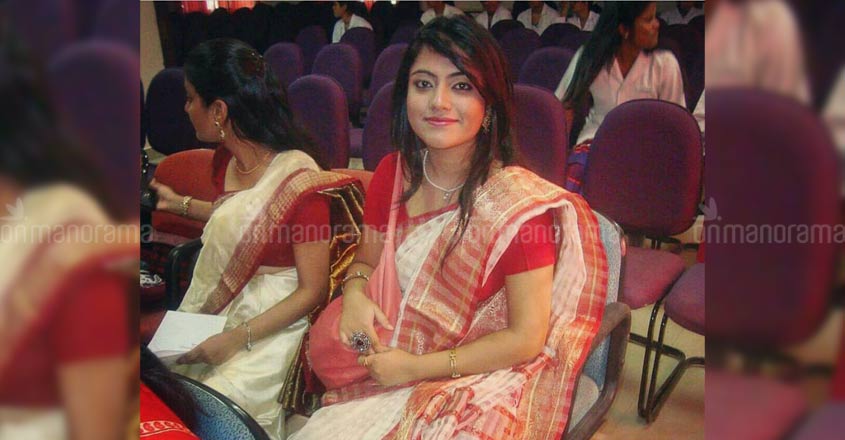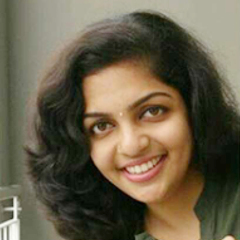Zealous young doctor fights breast cancer in villages

At 24, Dr Priyanjali Datta has helped over five lakh rural Indian women to carry out self-diagnosis and over a 3,000 of them could find and fight their breast cancer, through her NGO named Aaroogya.
At 24, Dr Priyanjali Datta has helped over five lakh rural Indian women to carry out self-diagnosis and over a 3,000 of them could find and fight their breast cancer, through her NGO named Aaroogya.
At 24, Dr Priyanjali Datta has helped over five lakh rural Indian women to carry out self-diagnosis and over a 3,000 of them could find and fight their breast cancer, through her NGO named Aaroogya.
How do you view a teenager's intent to change the course of world? You will be sceptical unless the person is an iconic figure like Malala Yousafzai or Severn Cullis-Suzuki. Naturally, when the dentistry student Priyanjali Datta, then 19, announced that she was going to start a fashion society and later a full-fledged non-profit organisation to fight breast cancer spreading in rural India, most of her teachers and batch-mates laughed – but not her family. At 24, Dr Priyanjali has helped over five lakh rural Indian women to carry out self-diagnosis and over a 3,000 of them could find and fight their breast cancer, through her NGO named Aaroogya.
For Priyanjali cancer is her enemy since her childhood, as she lost her beloved grandmother to it. After her mother was also diagnosed with a precancerous blood condition, the young dentist decided her destiny doesn't lie between teeth but mammae. “We were a peer-group of 12. We had organised over a 15 successful fashion shows in Delhi before the completion of our final internship. I was not very much inclined to the concept of general fashion though I knew fashion shows could easily pull the crowd. So I choreographed them so as to convey different stages of a women affected by breast cancer and methods to diagnose and prevent this menace in an early stage,” Priyanjali narrated her journey.

“After my mother was also diagnosed with a precancerous condition, I understood it is time to shift my focus from fashion to public health. I had graduated as a dentist by then. I kept my team together, did vast researches upon our nation's public health sector and realised that an enormous gap exists between rural India, its notion about public health, and the real public health infrastructure available in this country. We didn't wait a minute to organise our first medical camp to start exploring the grass-root realities,” she said.
The 'dead' UP sugarcane belt
Priyanjali hails from Umiam, a hilly lake-village in eastern Meghalaya. But when she chose the location for conducting her first medical camp, she picked the 'sugarcane belt' in Uttar Pradesh, that borders certain tributaries of Hindon river. “I have been studying and working in Delhi for 15 years now. I had heard about a 'dead river' that was extensively polluted by industrial waste. Government had asked the villagers not to use the river water even for cleaning purposes. But the villagers are consuming the same polluted water in lack of other water resources. Even their agricultural crops are intoxicated by severe industrial waste,” she said.
Team Aaroogya studied the lifestyle, education , contraceptive history and health ecosystem of around 2 lakh people and conducted a real-time health data analysis of selected 1,757 women. The team encountered path-breaking findings in the survey.
Madhuri (name changed), 32, was indifferent when the volunteers of Aaroogya diagnosed her mother with a stage-two ovarian cancer. She held that being an agricultural worker, she cannot afford consistent health check-ups and cancer treatment. She was alarmed when she listened to the genetic possibilities of breast cancer. After finding out that her mother's cancer originated in breast, Madhuri underwent a detailed clinical examination and was diagnosed with an early stage of breast cancer. “My mother and I have the same lifestyle; we eat the same food and drink water from the same source. I had been thinking that cancer diagnosis is wealthy folk's affair and that laymen cannot afford it,” she told Priyanjali. Madhuri fought her condition successfully and leads a normal life at present, along with her ailing mother.
In another eye-opening case study, a 56-year-old man hailing from Khaprana village, UP, was diagnosed with breast cancer. “Though he couldn't be saved as he had already reached the final stage, her daughter's primary stage of breast cancer could be diagnosed in a clinical examination at Aaroogya health camp. Now, his grand daughter has also been detected with a premature tumour in her breast and that has been sent for expert diagnosis,” Dr Datta revealed.
Priyanjali says that there is still a big taboo on breast cancer treatment in rural India, as most of them discourage their women to approach doctors for any disease related to their private parts. She has even examined a cancer patient whose condition worsened due to her reluctance to approach doctors in fear of ill-treatment from her villagers.
Aaroogya has conducted multiple medical camps across the Indian states of Uttar Pradesh, West Bengal, Meghalaya and Delhi NCR. Priyanjali stated that Uttar Pradesh has the highest rate of breast cancer among the four regions. Aaroogya has a fixed protocol for choosing a target area, disease diagnosis and treatment. About five lakh people have attended their medical camps so far, from which over a 3,000 women have been diagnosed with breast cancer. Team Aaroogya consists of general physicians, oncologists and health workers. Though started off in July 2016, Aaroogya was registered as an NGO in August 2017.
Technology helps
Priyanjali's team aims at adopting telemedicine to better their diagnostic techniques. “Telemedicine is the most convenient option to connect rural patients and metropolitan doctors. Poor internet connectivity, lack of expertise in professional telemedicine aids and resources stood in our path. However, we are soon collaborating with a major telemedicine company with which we will get a customised, radiation-free artificial intelligence device to carry out expert diagnosis,” she said.
Aaroogya is also keeping an active track of all the patients they have diagnosed with breast cancer. The team has been keeping the log manually ever since they started the venture but Aaroogya will soon be automated with the help of a customized data management software tool.
Family, an anchor
It was Priyanjali's father Sanjit Datta who was first convinced of her cause. With his doubtless belief in his daughter's determination and vision, Sanjit stood as a source of support and guidance for her fledgling organisation. “Dad is my hero. He has never ever discouraged the challenging, adventurous journey of my brain child, Aaroogya,” Priyanjali said. Her mother Nupur Datta is under medication for her rare blood condition at present. Priyanjali has a younger sister called Shreyanjali, who is a special child. “She was born with a disfigured right leg. With my exposure in medical field and through frequent medical camps, I could support her major surgery which was carried out last month. Twelve rods have been implanted onto her right leg. We hope she will be fine within a year,” Priyanjali hoped.
Miles to plod...
The doctor knows she has long paths to plod before she rests. “Breast cancer is a subject on which rural India is still to form a consensus on. We set our purpose before they form a prejudice. She remembers the case of Milana, a village in western UP, where average children born to a woman is six. “They have a strong-standing taboo against contraception. About 90 percent of the households considers it evil. Almost all women in that village suffer from back-ache, joint pains and aching legs. With wide use of tobacco, we find a high possibility of cancer among Milana women. Aaroogya intends to help such rural pockets where healthcare and medical awareness are low,” Priyanjali noted.

